![Medicine - Cancer Biology E-Newsletter [Vanderbilt University]](https://cdn.vanderbilt.edu/vu-URL/wp-content/uploads/sites/119/2017/11/19151037/cancer-biology-design-004.png)
|
|
June 2024
|
|

Summer, with its Nashville heat and humidity, is upon us! We continue to celebrate our recent Cancer Biology graduates who successfully defended this summer. A huge congratulations to Drs. Adam Miranda (Park/Hodges Labs), Demond Williams (Fingleton Lab), Natalie Bennett (Rhoades Lab), and Logan Northcutt (Rhoades/Rafat Labs)! We wish you all great success as you move to the next stage of your career.
We are also thrilled to welcome ELEVEN new students to the Cancer Biology program this year! Please take a moment to say hello, welcome them to the community, and ask about their research. Please also take a moment to wish our third-year students luck on their qualifying exams! They are doing a stellar job preparing.
Looking ahead to the fall, the Cancer Biology Student Association (CBSA) is already hard at work planning our annual Program in Cancer Biology retreat! Please save the date for September 12, 2024. It will surely be a good time, with presentations, activities, food, and networking opportunities! This is an excellent opportunity for faculty to interact with and support the trainees in our program. Stay tuned for details; we look forward to seeing you all there!!
Take care,
Rachelle Johnson, PhD

To our new PhD candidates in the Program in Cancer Biology
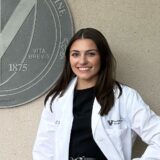 Emily Jaremba Emily Jaremba
(Rhoades Lab)
Emily’s research will focus on pre-clinical studies surrounding Gli2 (a transcription factor upregulated in bone metastatic tumors) inhibitors targeted to the bone microenvironment. Specifically, she will focus on drug mechanisms and drug synergy of Gli2 inhibitors in combination with standard-of-care therapies in bone metastatic cancer models. Emily will also collaborate with the Duvall group to study bone tumor-targeted nanoparticles co-loaded with Gli2 inhibitors and standard-of-care therapies. Emily enjoys playing volleyball, bike riding, and exploring new places in her free time!
 Joseph Serrenho Joseph Serrenho
(Balko lab)
Joseph’s research in the Balko lab will focus on characterizing tumor-specific major histocompatibility complex-II (tsMHC-II) expression as a predictive biomarker for immunotherapy response in breast cancer. His project will also focus on understanding the mechanisms that attenuate tsMHC-II expression in breast cancer and exploring methods to target tsMHC-II suppression pathways to improve response to immunotherapies therapeutically. Outside of the lab, Joseph enjoys exploring parks in Nashville with his labradoodle, Darwin. He also enjoys running, traveling and is searching for the best cold brew in Nashville.
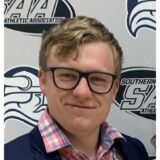 Bryce Thomas Bryce Thomas
(Park lab)
Bryce is a graduate student in the Park lab, where he developed a novel in-vitro CRISPR screen that identified genetic moderators’ cell-free DNA (cfDNA). Bryce’s proposed thesis work aims to further this work with in-vivo experiments. He has hypothesized that the tumor microenvironment (TME), specifically the immune TME, will affect how cells release cfDNA. He will further explore this using immune-competent mice and patient-derived xenograft models. Circulating cfDNA is often in low quantities due to rapid degradation by nucleases present in the microenvironment and bloodstream. He will explore drug combinations that increase tumor apoptosis and nuclease inhibitors to hopefully increase the amount of cfDNA present in the bloodstream of our mice models. Using our novel CRISPR screen, he will compare the knockout clones that are over/under-represented between cfDNA and genomic DNA, which are identical to the techniques demonstrated in vitro. Our hope is that this work will be able to translate our findings for clinical relevance and specifically be able to address how the TME influences the genetic effectors of cfDNA release.”

Erykah J. Coe
(Rhoades lab)
Erykah came to Vanderbilt in 2022 after completing a Bachelor’s in Cellular and Molecular Biology at Hampton University (2020) and an IRTA Fellowship in the Vaccine Immunology Program (2022). While at the NIH, she focused on developing naïve B cells to make antibodies that can fight HIV mutation in anticipation of boosting and maturation using HIV trimers, leading to the development of potential vaccines. Her current research interest is understanding how adipocytes interact in the tumor microenvironment. Erykah has also received the Neurodiversity Inspired Science and Engineering (NISE) Traineeship through The Frist Center for Autism and Innovation at Vanderbilt University! She is immensely thankful for the opportunity to contribute to the outstanding research the Frist Center produces.
In her free time, Erykah loves to play with her dog, Bo, read books based on thrillers, true crimes, and mysteries, watches Law and Order, SVU, and Criminal Minds (for the 5th time), and spends time with friends!
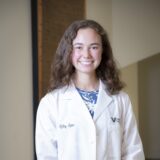 Kelby M Kane Kelby M Kane
(Chen Lab)
Kelby completed her undergraduate degree in Biology at the University of Tennessee-Martin in 2022 and worked at the University of Kentucky before attending Vanderbilt. Her research will examine how the metabolic interactions between tumor endothelium and other cell types within the tumor microenvironment can promote metastatic outgrowth. Outside the lab, Kelby enjoys running, working out, horseback riding, hiking with her dog on the weekends, reading, and cooking.
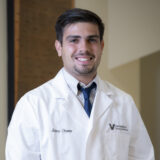 Andres Ocampo Andres Ocampo
(Balko Lab)
Andres’s research aims to identify patients with a higher risk of developing immune-related adverse events associated with immune checkpoint blockade therapy through thymic involution. Signatures from this analysis could aid in developing strategies to mitigate toxicity and guide therapeutic decision-making for patients. Additionally, Andres will work to discover peripheral blood biomarkers related to metastatic triple-negative breast cancer (TNBC) by performing bulk RNA sequencing on samples from a large clinical trial. This research will increase the understanding of metastatic TNBC and potentially develop strategies to prevent and treat its occurrence. Andres enjoys playing soccer, camping, backpacking, and fly fishing in his free time.
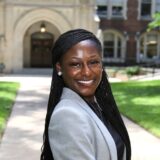 Jailyn Smith Jailyn Smith
(Johnson Lab)
Jailyn is from Winston-Salem, North Carolina, and attended North Carolina Central University during her undergraduate studies. She is currently a member of the Vanderbilt MSTP Program. Her research interests lie in translational research of breast cancer, identifying potential pathways that can be clinically targeted to decrease metastasis and tumor burden in these patients. She hopes to gain a better understanding of some of the health disparities in breast cancer as well. Jailyn is excited to join the Cancer Biology community and work with you all!
 Spenser Stone Spenser Stone
(Rathmell Lab)
Spenser’s research will focus on the role of immune checkpoints on tumor-associated macrophages (TAMs) in both lean settings and in diet-induced obesity models. Obese individuals have been shown to respond better to immunotherapy, termed the “obesity paradox,” yet the mechanisms that create this better anti-tumoral response have not been defined. Immune checkpoints have traditionally been studied in T-cells, but macrophages have also been shown to express critical checkpoints such as PD-1 and Lag3. Spenser’s goal is to understand specific mechanisms contributing to anti-tumoral responses in this paradoxical setting that may be applied to non-obese patients. Spenser enjoys finding new books to read, hiking at Radnor Lake, eating sweets, and spending time with her cats in her free time.
 Dominic Schiano Dominic Schiano
(Kuriyan Lab)
Dominic will be involved in identifying and characterizing nanobodies/antibodies that interact with specific conformations of EGFR and HER2. He would like to develop a new generation of HER-family antibodies that can modulate conformation to “correct” pathological signaling of mutated HER receptors in cancer. Another important application of such antibodies is facilitating structural studies of the receptors by increasing rigidity so they can be imaged using cryo-EM. He will apply new methods, expressing antibody-like molecules (termed nanobodies) in the laboratory using yeast and bacterial cells, combined with a selection of desired properties from large collections of variants.
 Kailey Caroland Kailey Caroland
(Weiss Lab)
Kailey’s research work will focus on the role of Wnt signaling in cancer progression and metastasis. Previous studies from the Weiss lab have shown that in immune-competent mice, a Wnt-2-secreting thyroid cancer mouse model develops abundant liver metastases, while the parent model without Wnt-2 secretion is not metastatic. In immune-deficient mice, the Wnt-2 secreting model also has an increased number of liver metastases compared to the parent model. Kailey wishes to build upon these findings and investigate the idea that various Wnt ligands and Wnt signaling can support cancer progression and liver metastases across cancer types. Another aspect of her research will be focused on Bisphenol-A (BPA). BPA has been shown to increase Wnt signaling, and she will be investigating the role of BPA in promoting the development and progression of Wnt-driven cancers as well.
Outside of the lab, Kailey enjoys playing tennis, going to zoos and aquariums, and spending time with her one-year-old cat, Hiccup!

Hyundong Yoon
(TK Kims lab)
Hyundong will be joining the Program in Cancer Biology and is currently traveling. In the following newsletter, we will highlight and share his research.
|
|
RECENT VANDERBILT FACULTY AND TRAINEES PUBLICATIONS:
Programmable Albumin-Hitchhiking Nanobodies Enhance the Delivery of STING Agonists to Potentiate Cancer Immunotherapy (Preprint). Research Square, 2024 May 8. John Wilson, Vijaya Bharti, Ann Hanna, Emily Arner, Jinming Yang, Brandie Taylor, Jeffrey Rathmell, Ann Richmond, Wendy Rathmell, Justin Balko, Barbara Fingleton, Ebony Hargrove-Wiley, et al.
Beyond Anti-PD-1/PD-L1: Improving Immune Checkpoint Inhibitor Responses in Triple-Negative Breast Cancer. Cancers, 2024,16(12), 2189. Kennady Bullock PhD, Ann Richmond
Integrating integrins with the hallmarks of cancer. Matrix Biol. 2024 Jun;130:20-35. Haake SM, Rios BL, Pozzi A, Zent R.
Velociraptor: Cross-Platform Quantitative Search Using Hallmark Cell Features. bioRxiv [Preprint]. 2024 May 4:2024.Cross CE, Rathmell JC, Weaver KD, Ihrie RA, Irish JM, et al.
Nanoparticle Retinoic Acid-Inducible Gene I Agonist for Cancer Immunotherapy. ACS Nano. 2024 May 7;18(18):11631-11643. Lihong Wang-Bishop, Jinming Yang, Ann Richmond, John T. Wilson.
Epithelial Expressed B7-H4 Drives Differential Immunotherapy Response in Murine and Human Breast Cancer. Cancer Res Commun. 2024 Apr 24;4(4):1120-1134. Elizabeth C. Wescott, Xiaopeng Sun, Ann Hanna, Brandie C. Taylor, Susan R. Opalenik, Vijaya Bharti, John T. Wilson, Brian D. Lehmann, Vandana G. Abramson, Jennifer A. Pietenpol, Justin M. Balko.
Ribosome subunit attrition and activation of the p53-MDM4 axis dominate the response of MLL-rearranged cancer cells to WDR5 WIN site inhibition. bioRxiv [Preprint]. 2024 Jan 10:2023.07.26. Gregory Caleb Howard, Logan Vlach, Michael Savona, Frank Mason, Stephen Fesik, Qi Liu, William Tansey, et al.
Technology accountability groups: A novel form of technology learning and support for graduate students and faculty in STEM. Journal of Cellular Physiology. 2024 June 18. Feather Ives, Celestine Wanjalla, Antentor Hinton Jr., et al.
Integrating integrins with the hallmarks of cancer. Matrix Biol. 2024 Jun:130:20-35. Haake SM, Rios BL, Pozzi A, Zent R.
The broad impact of cell death genes on the human disease phenome. Cell Death Dis. 2024 Apr 8;15(4):251. Rich AL, Lin P, Gamazon ER, Zinkel SS.
After wounding, a G-protein coupled receptor promotes the restoration of tension in epithelial cells. Mol Biol Cell. 2024 May 1;35(5). Han IS, Page-McCaw A, Hutson MS, et al.
Clonal Hematopoiesis and Inflammation in the VasculaturE (CHIVE): a prospective, longitudinal cohort and biorepository. Blood Adv. 2024 April 12. Shannon ML, Silver AJ, Ferrell PB Jr, Bick AG, Savona MR, et al.
Regulation of fatty acid delivery to metastases by tumor endothelium. bioRxiv [Preprint]. 2024 Apr 3:2024.04.02.587724. Edwards DN, Wang S, Song W, Kim LC, Ngwa VM, Hwang Y, Ess KC, Boothby MR, Chen J.
EVPsort: An Atlas of Small ncRNA Profiling and Sorting in Extracellular Vesicles and Particles. J Mol Biol. 2024 Apr 10:168571. Chen HC, Wang J, Coffey RJ, Patton JG, Weaver AM, Shyr Y, Liu Q.
IL-17RA-Mediated Epithelial Cell Activity Prevents Severe Inflammatory Response to Helicobacter pylori Infection. Immunohorizons, 2024 April 1;8(4):339-353. Brackman LC, Wroblewski LE, Piazuelo MB, Peek RM Jr, Choksi YA, et al.
Immune-monitoring of myelodysplastic neoplasms: Recommendations from the i4MDS consortium. Hemasphere. 2024 May 15;8(5):e64. Madeline Hayes, Brent Ferrell, Jonathan Irish, et al.
Wnt/β-catenin signaling is a therapeutic target in anaplastic thyroid carcinoma. Endocrine, 2024 May 28. Diana Diaz, Kensey Bergdorf, Matthew Loberg, Sheau-Chiann Chen, Megan Tigue, Jeremy Goettel, Ethan Lee, Vivian Weiss, et al.
Single Cell Profiling Distinguishes Leukemia-Selective Chemotypes (Preprint). bioRxiv. 2024 May 3:2024. Hannah Thirman, Madeline Hayes, Jonathan Irish.
Resolution of Acinar Dedifferentiation Regulates Tissue Remodeling in Pancreatic Injury and Cancer Initiation. Gastroenterology. 2024 May 9:S0016-5085(24)04911-4. Jonathan Balden, Kathleen DelGiorno, et al.
Obesity induces PD-1 on macrophages to suppress anti-tumour immunity. Nature. 2024 June 12. Jackie Bader, Melissa Wolf, Matthew Madden, Bradley Reinfeld, Emily Arner, Emma Hathaway, KayLee Steiner, Elysa Wolf, Scott Haake, Kathryn Beckermann, Cynthia Reinhart-King, W Kimryn Rathmell, Alyssa Hasty, Jeffrey Rathmell, et al.

CONFERENCES OF INTEREST:
CABS (Cancer and Bone Society) meeting will be held July 12-14, 2024, in Sheffield, England. Register here.
MVTCP Equity in Cancer Research Program (ECRP). This program will financially support travel to cancer research meetings to present research. Application due date: August 2, 2024. Application Link. For more information, contact Kim Dahlman.
Addressing Cancer Control and Care in Rural Communities, A National Rural Cancer Control Conference. August 8-9, 2024. Register here.
11th Annual Southeastern Immunology Symposium. Hosted by the University of Alabama in Birmingham. August 16 – 17, 2024, at the Red Mountain Theatre. Register here.
VCI 2024 Retreat. October 2-3, 2024. Fall Creek Falls, Spencer, TN. Please contact summer.brown@vumc.org to register.
SEMINAR SERIES:
VICC Seminar series
VI4 Seminar Series

|
|
Our new trainees were welcomed into the Program with a celebration at the West End Tower. Below are some pictures of our members at the gathering.
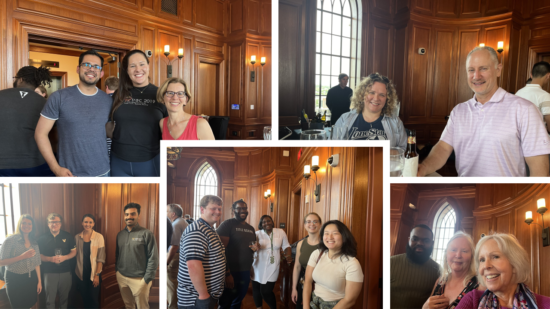
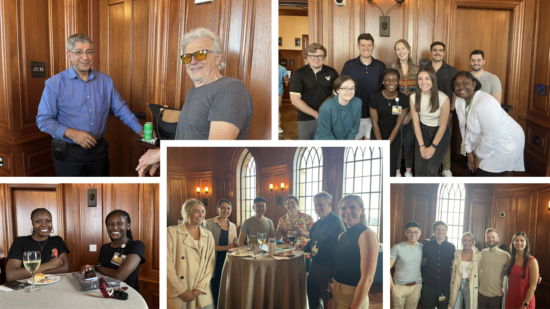
The Program in Cancer Biology Celebrates our newest PhD’s
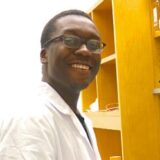 Demond Williams, PhD Demond Williams, PhD
Dr. Williams successfully defended his dissertation and research work, which determined that Type II Interleukin-4 Receptor Activation in Basal Breast Cancer Cells Promotes Tumor Progression via Metabolic and Epigenetic Modulation. Dr. Williams and his team published this work in the International Journal of Molecular Sciences. Dr. Williams has accepted a postdoctoral position in Dr. Troy McEachron’s lab at the NIH. We all look forward to following your future scientific career!
 Natalie Bennett, PhD Natalie Bennett, PhD
Dr. Bennett successfully defended her dissertation to receive her PhD in Cancer Biology! Dr. Bennett presented her research in “Characterizing Novel Tumor Microenvironment Interactions in Gli2-Enriched Cancers.” She is so thankful for her entire support system and the amazing mentorship she has received at Vanderbilt and with Julie Rhoades! Onward to the final year of medical school!
 Logan Northcutt, PhD Logan Northcutt, PhD
GEM Fellow, 2021 SMDP Biotech Scholar, 2023 Janssen Scholars of Oncology Diversity Engagement Program.
Dr. Northcutt successfully defended his dissertation, “Matrix Rigidity Influences Breast Cancer Cell Behavior in Bone Marrow-Like Microenvironments.” For the last 5.5 years at Vanderbilt, Dr. Northcutt has evaluated how different rigidities of the bone marrow influence breast cancer cell progression by utilizing different biomaterial systems. Dr. Northcutt has accepted a postdoctoral fellow position at the University of Pennsylvania. He will be working with Dr. Guilherme Nader and Dr. Janis Burkhardt through the NIH Institutional Research and Academic Development Award (IRACDA) Program. We will miss you and wish you the very best!

Adam Miranda, PhD
Dr. Miranda has successfully defended his dissertation research, Genomic dissection and mutation-specific target discovery for breast cancer PIK3CA hotspot mutations.
Dr. Miranda was so pleased and said, ” You can get good news at 1 AM. Proud to announce that my thesis research has been accepted for publication at BMC Genomics!”
Dr. Miranda has taken a position with the Vanderbilt University Medical Center, where he will work under the mentorship of Drs. Xingyi Guo and Debra Friedman. HIs passion is to uncover the molecular mechanisms of cancer initiation and progression, and to translate the findings into novel therapeutic strategies. With his strong background in molecular biology, genomics, bioinformatics, collaboration, innovation, and diversity we wish you much success in your future career.
 Vanderbilt-Ingram Cancer Center’s 25th Annual Scientific Retreat detailed the history of hereditary cancer discoveries and gave overviews of ongoing research. Vanderbilt-Ingram Cancer Center’s 25th Annual Scientific Retreat detailed the history of hereditary cancer discoveries and gave overviews of ongoing research.
Speakers at the VICC conference included Damaris Olagundoye, MD, who shared how breast cancer and ovarian cancer had affected generations of her family, including herself. A survivor of both breast and kidney cancer, Dr. Olagundoye said she didn’t learn until her diagnosis that a mutation in the BRCA2 gene ran through her maternal bloodline.
Speaker Bert Vogelstein, MD, has been named the most highly cited scientist in the world by the Institute for Scientific Information and is known for his groundbreaking work on cancer genetics. Dr. Vogelstein provided a historical timeline of his research, which led in 2017 to the U.S. Food and Drug Administration’s (FDA) first approval for a cancer drug prescribed according to molecular phenotype instead of a specific organ site. That drug is the immunotherapy pembrolizumab.
The annual scientific retreat also celebrates the achievements of graduate students and postdoctoral scholars committed to cancer research. The following Program in Cancer Biology trainees were highly successful with their poster presentations and research:
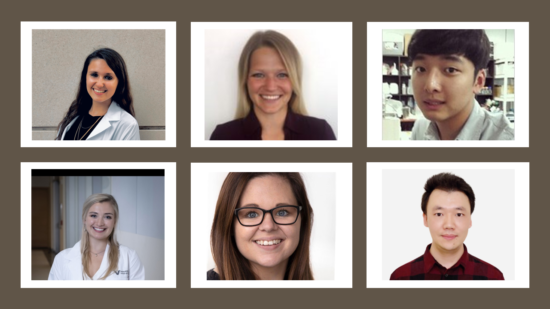
Overall Exceptional Poster ($500 Prize):
Amanda Hesterberg (Mentor: Paula Hurley, PhD) Asporin Functions as a Novel HER3 Ligand to Induce Prostate Cancer Cell Migration.
Basic Science Category-2nd Place ($200 Prize):
Emily Arner, PhD (Mentor: Jeffrey Rathmell, PhD) NDUFA4L2 Drives Metastasis by Inhibiting Oxidative Phosphorylation.
Riley Bergman (Mentor: Ben Ho Park, MD, PhD) Honorable Mention for her research titled, The Role and Tolerability of SF3B1 Hotspot Mutations in Breast Cancer.
Youn Jae Jung, PhD (Mentors: John T. Wilson, PhD & Alissa Weaver, MD, PhD) Honorable Mention for his research titled, VAP-A Regulates the Secretion of Small Extracellular Vesicles and Tumor Progression in Immunocompetent Models of Colorectal Cancer.
Xiaoyong Wang, PhD (Mentor: Jin Chen, MD, PhD) Honorable Mention for his research titled, Loss of Metabolic Gene Cpt1A Promotes Breast Cancer Metastasis to the Lung via Immune Modulation.
Translational Science Category:
Julia Steele (Mentor: Justin Balko, PharmD, PhD) Honorable Mention for her research titled, A Chimerized HER2 Receptor: A Sensitive and Tolerated Model of HER2+ Breast Cancer for Functional and Immunologic Studies with Anti-HER2 Antibody Therapies.
Program in Cancer Biology Research and News
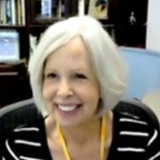 I am delighted to inform you that as of July 1, 2024, Rachelle Johnson will take the lead as Director of the Program in Cancer Biology. She will also continue to serve as Director of Graduate Studies. While I will greatly miss each of you, due to family commitments, it is best that I step back from some of my responsibilities at Vanderbilt. While I will continue participating as much as possible, Rachelle will take the reins. Rachelle is an exceptional mentor and leader; I know she will do an outstanding job! I am delighted to inform you that as of July 1, 2024, Rachelle Johnson will take the lead as Director of the Program in Cancer Biology. She will also continue to serve as Director of Graduate Studies. While I will greatly miss each of you, due to family commitments, it is best that I step back from some of my responsibilities at Vanderbilt. While I will continue participating as much as possible, Rachelle will take the reins. Rachelle is an exceptional mentor and leader; I know she will do an outstanding job!
Sincerely,
Ann Richmond
 Déja M Grant Déja M Grant
(Johnson Lab)
Déja is a PhD candidate and thoroughly enjoys working with the Cancer & Bone Society Early-Stage Investigator (CABS ESI) Subcommittee! She has wanted to broaden her exposure to organizations that are more focused on her area of research, and this opportunity has allowed her to expand her connections in the bone field. Déja has connected with other trainees and collaborated to incorporate new events for herself and other young investigators in the cancer and bone field.
Other exciting news for Déja is that her cross-section image of the bone was featured in this year’s Nanostring Calendar, and she has been selected as a 2024 SMDP Biotech Scholar (Scientist Mentoring & Diversity Program for Biotechnology)! SMDP is a career mentoring program that pairs students with industry mentors at biotech/consumer healthcare companies. This month, Déja attended the 2024 BIO International Convention in San Diego. She is excited to grow connections with her cohorts as they continue building and developing their professional brand and network! The Entire Cancer Biology program is proud of your hard work!

Zachary Bacigalupa, Ph.D.
Research Assistant Professor of Pathology, Microbiology and Immunology
Dr. Bacigalupa started this research project as a post-doc in 2018 and has seen his family grow and endure a global pandemic, among other personal trials.
HIF-2α expression and metabolic signaling require ACSS2 in clear cell renal cell carcinoma. This paper demonstrates that acetate metabolism via ACSS2 enzymatic activity is required for ccRCC growth and serves as a multi-modal regulator of HIF-2α. In response to ACSS2 inhibition, they observed suppression of HIF-2α at both the transcript and protein level.
Mechanistically, this suppression reduced chromatin accessibility and enhanced proteasomal degradation. Notably, these experiments were performed without VHL, suggesting the involvement of a novel, VHL-independent degradation mechanism. They also identified a novel protein-protein interaction between HIF-2α and the E3 ubiquitin/SUMO ligase MUL1. Additionally, they show that MUL1 shares an inverse expression relationship with HIF-2α and influences responses to ACSS2 and HIF-2α inhibition.
Targeting the ACSS2-HIF-2α axis causes ccRCC cells to undergo a wide range of metabolic changes, including reduced cholesterol and glucose metabolism. Furthermore, EM analysis unveiled a loss of mitochondrial integrity specific to cancer cells treated with an ACSS inhibitor.
Importantly, these findings translated into reduced tumor growth in vivo and blocked cell growth in ex vivo cancer cell cultures derived from ccRCC patients.
 Ebony Hargrove-Wiley Ebony Hargrove-Wiley
(Fingleton Lab)
PhD candidate, NSF GRFP Fellow, and an Endocrine Society FLARE Fellow.
Ebony is happy to share that she has started as a Portfolio Program Management (PPM) EMBRACE Intern at AbbVie! Throughout the summer, she will be advised by Dr. David Sharon, part of Translational Oncology Precision Medicine, and Dr. Elizabeth Schmidt, PPM Manager, to assist in investigative and business efforts.
 Clip In 4 the Cure is a high-energy, team cycling event that raises funds to defeat cancer. Clip In 4 the Cure will take place on Saturday, September 14 from 8 a.m. to noon at GEODIS Park. Clip In 4 the Cure is a high-energy, team cycling event that raises funds to defeat cancer. Clip In 4 the Cure will take place on Saturday, September 14 from 8 a.m. to noon at GEODIS Park.
Register here.
 Have you received an award, a paper published or any other good news you would like to celebrate with our community? If so, please e-mail: kerry.w.vazquez@vanderbilt.edu. Have you received an award, a paper published or any other good news you would like to celebrate with our community? If so, please e-mail: kerry.w.vazquez@vanderbilt.edu.
Newsletter header photo credit to Dr. Anna Vilgelm, “DNA Comets.” Articles and Pictures credit to VU and VUMC. All other photo credit to unsplash.
|
|
|
Vanderbilt University is committed to principles of equal opportunity and affirmative action.
Vanderbilt®, Vanderbilt University®, V Oak Leaf Design®, Star V Design® and Anchor Down® are trademarks of The Vanderbilt University. ©2025 Vanderbilt University. All rights reserved.
|
|
![Medicine - Cancer Biology E-Newsletter [Vanderbilt University]](https://cdn.vanderbilt.edu/vu-URL/wp-content/uploads/sites/119/2017/11/19151037/cancer-biology-design-004.png)